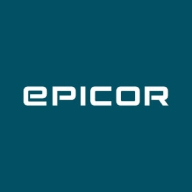

Epicor ERP and ERPNext compete in the enterprise resource planning market. Epicor ERP has an advantage in customer support and pricing, while ERPNext is preferred for its robust feature set.
Features: Epicor ERP includes advanced manufacturing, supply chain management, and financial management, targeting mid-sized to large enterprises. ERPNext offers a versatile suite that covers accounting, project management, and CRM, emphasizing simplicity and customization.
Ease of Deployment and Customer Service: Epicor ERP often requires complex deployment suited for extensive customizations. Its customer service is effective for large enterprises. ERPNext supports a cloud-based deployment model with a strong online community, ensuring smoother setup for smaller businesses with flexible, self-managed integrations.
Pricing and ROI: Epicor ERP involves higher initial setup costs designed for businesses anticipating long-term returns. Despite its cost, it provides value through specialized applications. ERPNext offers competitive pricing with lower upfront costs and quicker ROI. Its open-source model provides an affordable option for cost-conscious businesses.


Capture the true value of cloud ERP with Epicor Kinetic, a solution made with manufacturers, for manufacturers. An intuitive, configurable, and guided user experience with embedded learning helps you maximize your profitability with real-time business intelligence and built-in collaboration tools. Kinetic has the functionality you need to run a modern, future-ready business poised to capitalize on data, transform digitally, and innovate without limits. All the features you need to scale, compete, and attract top talent to your organization. Trust the manufacturing expertise of Epicor to gain the momentum and know-how you need to accelerate growth and innovation.
Epicor Kinetic is distinguished by its increasingly broad focus on planning and managing all resources, both within and across locations and company boundaries. Power your business with a secure, tightly integrated ERP and embedded capabilities. This expanded scope is most strongly felt in the areas of Customer Relationship Management (CRM), Supply Chain Management (SCM), Advanced Planning and Scheduling (APS), Product Lifecycle Management (PLM), Advanced Manufacturing Execution System (MES), Quality Management System (QMS), Field Service Management (FSM), and Business Process Management (BPM) to name only a few. Manufacturers of all sizes have recognized the value of an integrated suite rather than trying to piece disparate solutions together.
ERPNext is an open-source ERP system known for its flexibility and comprehensive capabilities, tailored for various business needs. It integrates multiple business processes into a single platform, enabling seamless operations and efficient resource management for organizations.
ERPNext offers an extensive range of features designed to streamline business operations across sectors, including manufacturing, retail, and services. Its modular structure supports accounting, human resources, inventory, and project management. Recognized for adaptability, ERPNext allows users to customize and extend functionalities, although improvements are encouraged in reporting tools and system scalability.
What are the key features of ERPNext?ERPNext is leveraged across industries like manufacturing, where it assists in production planning and inventory oversight. In retail, it manages point-of-sale operations and customer engagement. Service industries use ERPNext for project management and resource allocation, ensuring efficient service delivery.
We monitor all ERP reviews to prevent fraudulent reviews and keep review quality high. We do not post reviews by company employees or direct competitors. We validate each review for authenticity via cross-reference with LinkedIn, and personal follow-up with the reviewer when necessary.